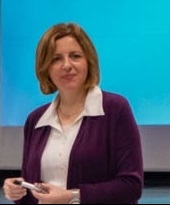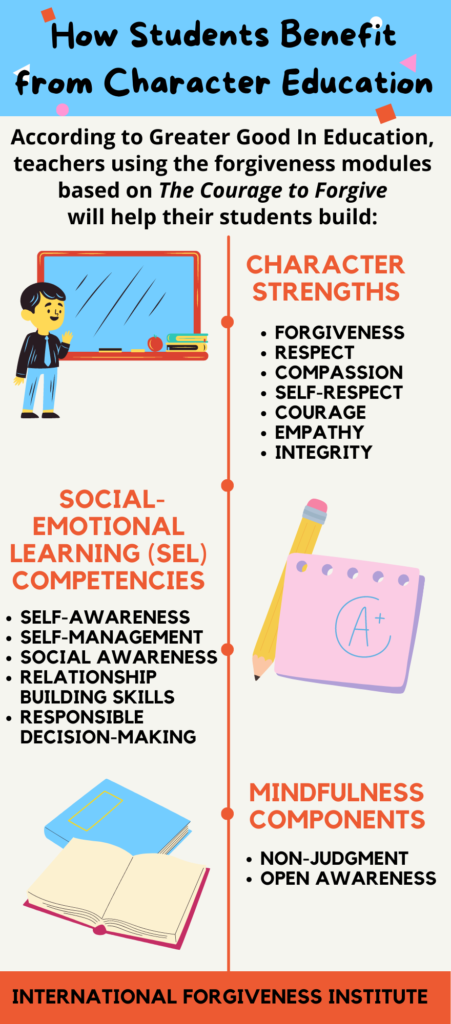Tagged: “adolescents”
Forgiveness Education in Greek Schools Now Includes How to Handle Trauma and Anger
More than 3,000 grade school students in Greece are learning how to reduce their anger, increase cooperation, gain resilience, and transform their traumas into personal character strengths through Forgiveness Education classes during this 2021-2022 school year.
“Trauma Transformation Through Forgiveness Education” is a social-emotional learning (SEL) program developed by Dr. Peli Galiti, Ph.D., M.Ed., research scholar at the University of Wisconsin – Madison. Dr. Galiti, a native of Athens, is also Director of the Greek Forgiveness Education Program (GFEP) started in 2014 by the Madison-based International Forgiveness Institute (IFI).
“This one-of-a-kind program is based on the educational research studies conducted by Dr. Robert Enright who pioneered the field of Forgiveness Education,” says Dr. Galiti. “His studies have demonstrated that Forgiveness Education classes help students reduce in anger and hostile attribution, increase in empathy, and actually result in improved grades.”
Dr. Enright is a UW-Madison educational psychology professor who co-founded the International Forgiveness Institute in 1994. He has developed comprehensive Forgiveness Education curricula for students in grades K-4 through 12th that are now being used in more than 30 countries around the world.
According to Dr. Galiti, the new program is actually a collaboration between the IFI, UW-Madison, and two Greek universities—the Aristotle University of Thessaloniki and the National and Kapodistrian University of Athens (where Dr. Galiti previously lectured). Funding is provided by the Athens-based Stavros Niarchos Foundation, one of the world’s leading private, international philanthropic organizations. The program also has the endorsement of the Greek Ministry of Education.
Dr. Galiti began implementation of the Trauma Transformation program last September by leading a series of Forgiveness Education workshops for 110 Greek teachers. Those teachers are delivering the forgiveness classes this semester at schools in four Greek cities–Athens, Larisa, Patra, and Thessaloniki.
That training focused on techniques and methods the teachers could use to help their students manage traumatic experiences and any personal or relational difficulties that might cause harm and pain. Thematic instructional units included:
- Forgiveness Education theory and principles.
- Why forgiveness is necessary and how it is applied in the school environment.
- Theories about trauma and its treatment.
- Transformation and wound healing through Forgiveness Education.
- Collaboration in the classroom and conflict resolution.
- The experience of Forgiveness Education in Greek schools: Best Practices and Case Studies.
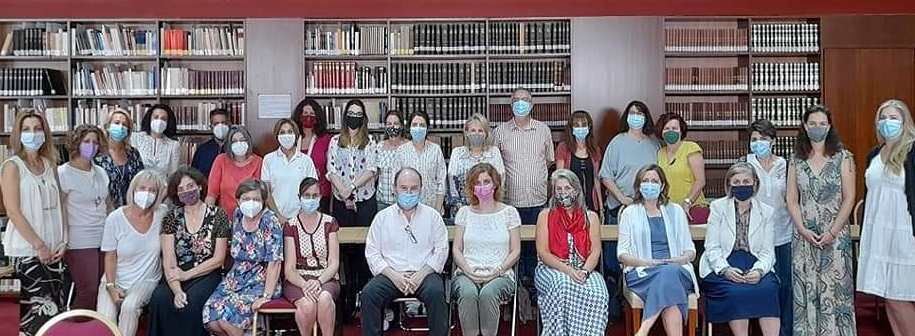
These grade school teachers in Athens were among the 110 teachers who received Forgiveness Education training conducted by Dr. Peli Galiti as part of the collaborative effort between the University of Wisconsin-Madison and the University of Thessaloniki.
The collaborative training efforts for this Forgiveness Education program have received support and major funding through the Greek Diaspora Fellowship Program that is designed to help avert Greece’s brain drain and develop long-term, mutually beneficial collaborations between universities in Greece, the United States, Canada, South Africa and Australia. The Fellowship Program is managed by the Institute of International Education in collaboration with the Fulbright Foundation in Greece, and funded by the Stavros Niarchos Foundation.
In 2017, Dr. Galiti was one of 30 Greek- and Cypriot-born scholars representing 28 prominent United States and Canadian universities who traveled to Greece to conduct academic projects with their peers at Greek universities as part of the Greek Diaspora Fellowship Program. As part of her fellowship, Dr. Galiti hosted workshops about Restorative Justice and Forgiveness Education, along with conducting research about bullying prevention and class collaboration.
- Visit the Greek Forgiveness Education Program website.
- Watch a 4 min. 12 sec. video about the Greek program: Learning to Forgive.
- Read more about Dr. Galiti’s eductional work in Greece.
- Watch a video webinar on Greek Forgiveness Education featuring presentations by Dr. Galiti and Dr. Enright.
About the Stavros Niarchos Foundation:
The Stavros Niarchos Foundation (SNF) (www.SNF.org), is one of the world’s leading private, international philanthropic organizations, making grants in the areas of arts and culture, education, health and sports, and social welfare. Since 1996, SNF has committed more than $3.3 billion through 5,100 grants to nonprofit organizations in 135 countries around the world.
The Foundation funds organizations and projects that are expected to achieve a broad, lasting and positive impact for society at large, and exhibit 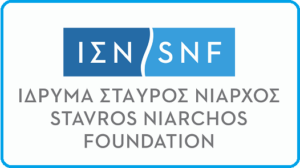 strong leadership and sound management. The Foundation also supports projects that facilitate the formation of public-private partnerships as an effective means for serving public welfare. In addition to its standard grants, the SNF has continued to respond to the urgent needs of Greek society, by providing relief against the severe effects of the socioeconomic crisis through three major grant initiatives of $378 million.
strong leadership and sound management. The Foundation also supports projects that facilitate the formation of public-private partnerships as an effective means for serving public welfare. In addition to its standard grants, the SNF has continued to respond to the urgent needs of Greek society, by providing relief against the severe effects of the socioeconomic crisis through three major grant initiatives of $378 million.
Greater Good in Education Promotes Forgiveness/Character Education
An internationally-acclaimed organization that provides research-based tools for professional educators is touting the most recent International Forgiveness Institute (IFI) curriculum guide by creating an entire “best practices” forgiveness component for educators on its website.
Forgiveness for Elementary School is a collection of four practices that provide students with tools to help them understand and begin a journey toward forgiveness. Published on the Greater Good in Education (GGIE) website, the module is dedicated to helping teachers implement learning techniques that focus on forgiveness, mindfulness, and character education.
Those techniques are presented in the new IFI Curriculum Guide The Courage to Forgive: Educating Elementary School Children About Forgiveness. The guide was written by Dr. Suzanne Freedman, forgiveness researcher and Professor of Educational Psychology at the University of Northern Iowa, and Dr. Robert Enright, IFI founder and Professor of Educational Psychology at the University of Wisconsin-Madison.
The Courage to Forgive is a social-emotional learning (SEL)/character education teaching guide that features 16 lessons, each approximately 45 minutes in length. It includes a comprehensive 15-page introduction that explains what forgiveness is (and is not) as well as why forgiveness is such a crucial subject for grade school students. The guide becomes the 15th volume in the IFI’s library of curriculum guides (for students in pre-kindergarten through high school) and the 19th educational training program offered by the IFI.
“Although the new curriculum was written specifically with 4th and 5th grade students in mind, it can be used with younger students as well as those in middle school,” according to Dr. Freedman. “We designed it so that the instructional activities can be modified as necessary for different age groups–even adults.”
The GGIE website component includes these four modules which are based on The Courage to Forgive curriculum:
1. Creating Space for Forgiveness by Letting Go of Anger
In this module, students discuss the negative consequences that anger can have, identify the benefits of letting go of anger after expressing it, and brainstorm ideas for how to cope with anger.
2. Introduction to Forgiveness
Students develop a working definition for what forgiveness is and what it is not, and consider its relationship to justice, revenge, the role of apology, and reconciliation.
3. Understanding Inherent Worth: A Path towards Forgiveness
As a class, students read the book Let’s Talk About Race by Julius Lester to begin a discussion on inherent worth, then think critically about how inherent worth and forgiveness are related. Links to a virtual reading of the book are included.
4. Learning from Courageous Forgivers
Students read The Story of Ruby Bridges by Robert Coles and reflect on the value of being a forgiving person, as exemplified by the story. Again, links to a virtual reading are provided.
“Forgiveness education focuses on recognizing and validating students’ anger, as well as teaching students to express emotions in a healthy way, understand the perspective and humanity of others, and practice empathy and compassion toward others,” Dr. Freedman added. “It is almost impossible to go through life without experiencing hurt, and knowing how to forgive gives students the opportunity to choose love and kindness over anger and hatred.”
Greater Good in Education is produced by the University of California-Berkeley’s award-winning Greater Good Science Center (GGSC). The Greater Good Education Program presents education professionals with practical, scientific insights that help them better understand the roots ![]() of kind, helpful–or “prosocial”–behavior and emotional well-being, and how they can build those skills in themselves, their colleagues, and their students.
of kind, helpful–or “prosocial”–behavior and emotional well-being, and how they can build those skills in themselves, their colleagues, and their students.
The 65-page The Courage to Forgive curriculum guide is available in downloadable electronic format on the IFI website for $30. GGIE readers are able to purchase the electronic version at a discounted price of just $15.
Which is harder, to forgive close family members or to forgive strangers?
In my experience, it is much harder, on the average, to forgive close family members. This is the case because those close to us are supposed to love us and not treat us deeply unjustly. There can be a deep sense of betrayal when someone, who is supposed to love us, acts very unjustly. As one more point, the answer to your question also depends on how serious the injustice is from the family member and from the stranger. If the stranger’s injustice is horrific, then this person will be harder to forgive than family members who do not act nearly as unjustly.
I grew up in a household in which my parents got angry quickly and expressed their anger often. I am about to get married. What cautions do you see for me?
I would recommend that you have a discussion with your future marriage partner about the kinds of patterns that occurred in each of your families of origin. Try to see the woundedness that was expressed in each family. This is because both of you might reproduce those patterns of woundedness with each other in the years to come. Your being aware of the wounds in your parents (and siblings), as well as your own woundedness from these, may help both of you from inadvertently passing those wounds onto each other. Each of you forgiving family members for giving you wounds should help in this regard. I wish you the best in your upcoming marriage.
Forgiveness Research Tools Flying Out the Door and Around the World
When The Christian Science Monitor called him “the father of forgiveness research” nearly 20 years ago (Dec. 19, 2002), Dr. Robert Enright, a University of Wisconsin-Madison educational psychology professor, had just completed what the news organization called “the first study ever to show a cause-and-effect finding regarding physical health. . . and forgiveness.”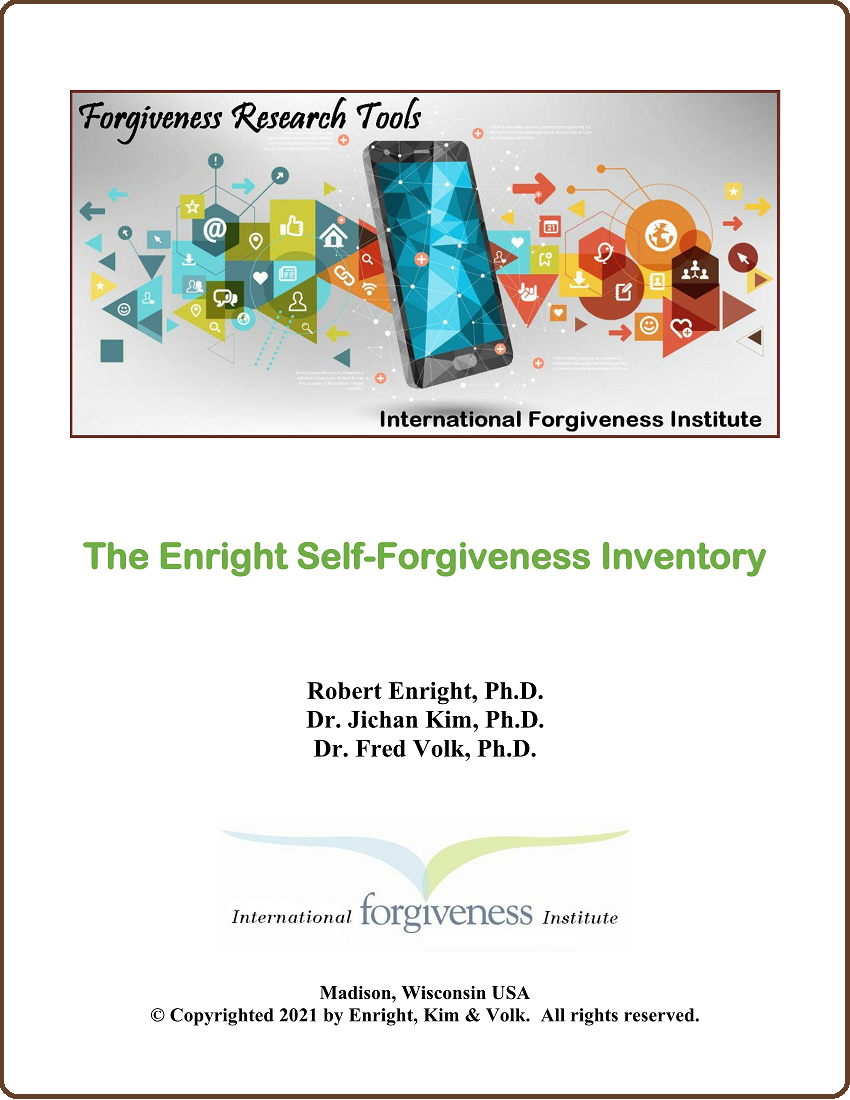
Today, as Dr. Enright nudges close to 37 years of forgiveness study and interventions, his research tools and techniques have become the preferred instruments of social scientists and researchers around the world. To stimulate even further growth in the burgeoning field, the forgiveness pioneer is giving his research tools away at no cost and with no strings attached.
On April 20 of this year, Dr. Enright announced that the non-profit educational organization he founded–the International Forgiveness Institute (IFI)–would provide his highly regarded scientific research tools absolutely free to any forgiveness researcher who requested them. In just the four months since then, the IFI has received and fulfilled orders for 252 copies of his individual tool documents from researchers in 21 foreign countries and 27 US states.
The free research tools available from the IFI and the number of copies distributed since April include:
- The Enright Self-Forgiveness Inventory (ESFI) – 76 Requests
This measure is based on the conceptualization of forgiveness as a moral virtue. The ESFI is a 30-item scale featuring six subscales with five items each. Five additional items at the end of the scale allow for measurement of Pseudo Self-Forgiveness (PSF). Although several competing self-forgiveness measures exist, Dr. Enright’s is the only one that captures the idea that self-forgiveness is a moral virtue that includes behavior toward the self.
- The Enright Forgiveness Inventory-30 (EFI-30) – 85 Requests
This tool is a shorter version of the Enright Forgiveness Inventory for Adults that has become the interpersonal forgiveness measure of choice for research professionals in the U.S. and abroad since its development in 1995. The EFI-30 reduces the number of items from 60 to 30 for the purpose of a more practical assessment of this construct. Data from the United States were used in the creation of the new measure and applied to seven nations: Austria, Brazil, Israel, Korea, Norway, Pakistan, and Taiwan to develop its psychometric validation.
- The Enright Group Forgiveness Inventory (EGFI) – 44 Requests
The EGFI has 56 items across seven subscales with each subscale having eight items. Those subscales measure a group’s motivation and values regarding forgiveness, peace, and friendliness toward the other group. The instrument is a valuable tool that could enhance peace efforts in the world. The EGFI was validated and published earlier this year by Dr. Enright and a team of 16 international researchers who collected data from 595 study participants in three different geographic and cultural settings of the world—China and Taiwan, Slovenia, and the US.
- The Enright Forgiveness Inventory for Children (EFI-C) – 47 Requests
The EFI-C is an objective measure of the degree to which a child forgives another who has hurt him or her deeply and unfairly. It is a 30-item scale similar to the 60-item adult version and is presented orally to very young children and in writing to those who can read well. Thanks to a researcher in Pakistan, the EFI-C is now available in the Urdu language—the native language of an estimated 230 million people, primarily in South Asia.
“Making these tools available to researchers at no cost is one way to grow the repository of forgiveness knowledge,” Dr. Enright explained. “This area of moral development has produced significant advancements in the areas of education, medical treatment, and therapy, so why not encourage others to help expand that information base?”
“There’s no getting around it – forgiveness is good for you and holding a grudge is not.”
-The Christian Science Monitor
- Learn more and order Dr. Enright’s free tools on the Forgiveness Research Tools page.
- Read how the EFI-30 was tested and validated in 8 countries around the world.
- Read the entire forgiveness article in The Christian Science Monitor.

